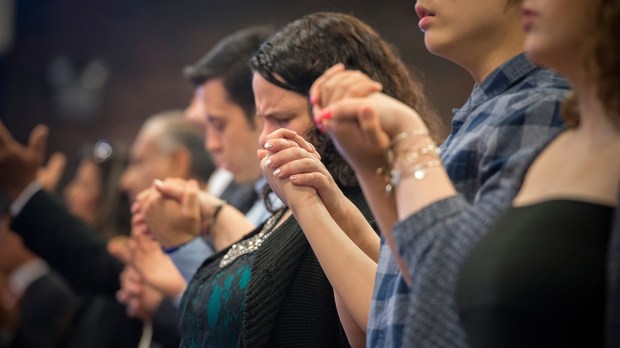We have asked a basic question while working our way through the Our Father: What are we praying for in these petitions?
Turns out we have prayed for the Gospel itself. It is only because of the Gospel that we can address God intimately as “Our Father.” We have also prayed that God will bring his Word to us, that he will tell us a story and not just any story but, in a snippet from an old English evangelical hymn, the Story “of Jesus and his love.”
In saying “holy is your name,” we ask that God’s name will do for us what a holy name should. We ask he will speak his Word to us clearly above all the other wordy noises we find so disturbingly distracting.
And we have prayed “your kingdom come,” that it will come to us in a way that that we may know him as Father.
We have asked for the greatest things possible.
But that is only the half of it, because in praying for ourselves, we have also been praying against ourselves.
We must because the hidden prayer in every human heart is not a prayer at all, but an audacious declaration: I want to have it my way, just like Burger King once said I could.
The unembellished prayer squatting within us goes like this: Hallowed is My name, My kingdom come, My will be done. This is so I can do everything I want, when I want, in just one phone call.
We default to the prayer of the fallen Adam, the fallen Eve, the same rattling prayer of dusty dead bones clashing together, the prayer of our old unwashed, unregenerate self.
That New Creation we have become? Well, see, that happened only because we were first buried into the baptism of Christ’s crucifixion (Romans 6:3-5), and then brought up again from death so we can have a stab at a new life. We asked for it and, unnervingly, the Father responded enthusiastically by promising the death of our old dead-bone self.
That’s the goal, anyway. It is what we have sought in Baptism and it is what we have received. There we join in the death of Christ. We are given what we sought; that’s the deal. Christ emerges from the new creation we have become. We were baptized so that we might pray “Thy kingdom come” and “Thy will be done” and actually welcome both. We were baptized for that.
This is so we may know God’s will and can see it for what it is, namely, not as a will of our own, not any more. “We are asking him to make us obedient so that his will may be done in us…” He must bend us, shape us to his purposes.
That’s St. Augustine talking. “God must make us obedient.” You’ll find that idea in one form or another numerous places, surprising places. “Away in a Manger,” the Christmas lullaby, has an arresting line at the third verse, actually a variant line, “and fit us for heaven to live with thee there.” We have to be fitted out for it, see? In Augustine’s sense, we ask the Father to make us obedient that his will will be done among us. If it is God’s will we seek, he’s promised to give it to us. We ask that we may know it.
We pray for it and here Christ bids us die. For in this third petition “Thy will be done,” we enter a field of contestation, a test of wills, ours opposed to God’s. To pray “your will be done” is to remember our burial to sin. Our will is submerged in baptism, a baptism to which we must return daily. The Our Father reminds of us of it.
There’s an old saying that God never burdens us with more than we can carry. If that is so, show me God’s list of the burdens I can carry. I don’t plan on complaining about them; I just want an inkling, a peek, of what he thinks I can carry. I suspect he and I might have different views on the matter.
I am burdened, by example, with my sins; usually the stupid ones I might have avoided had I but stopped to ask again for what he has already promised: Thy will be done, in me.
Over and over again, because that tends to be the way we sin, we find ourselves being pushed to the limit, to the edge of our endurance, treading too, too close to the verge of Jordan.
I know a former politician who was caught in scandal years ago. He told me he looked back at himself from that time and it is like he is watching someone else do what he did. Yet like the prodigal, he came to himself, lifted his guilt-born prayer and discovered strength greater than his own will.
Right at the edge, that daily edge of life where we totter, we pray “Thy will be done.” And God says, sure, no problem ― for God’s will is a grace where duty becomes delight. It wells up; a fountain of hope to carry us through troubles usually of our own making, hefting burdens Christ has taken for his own.
Previously: Thy Kingdom Come
Next: Give us today our daily bread

